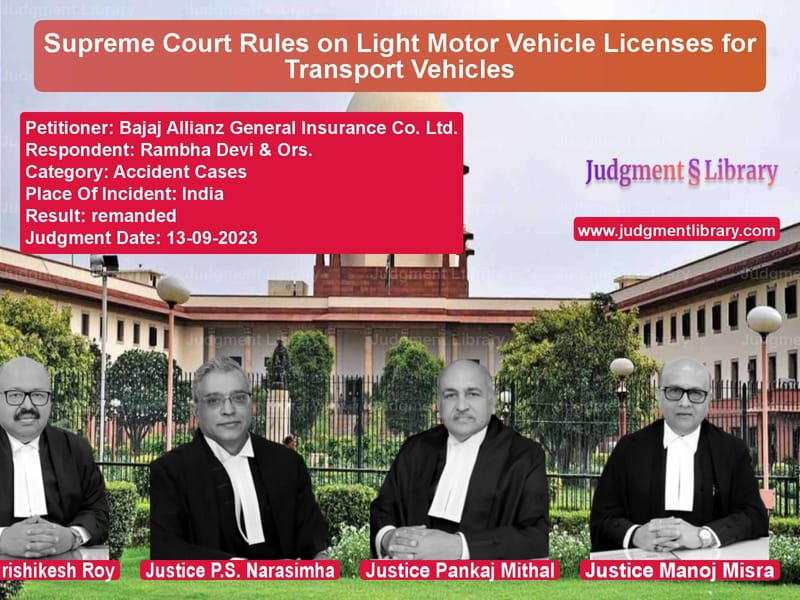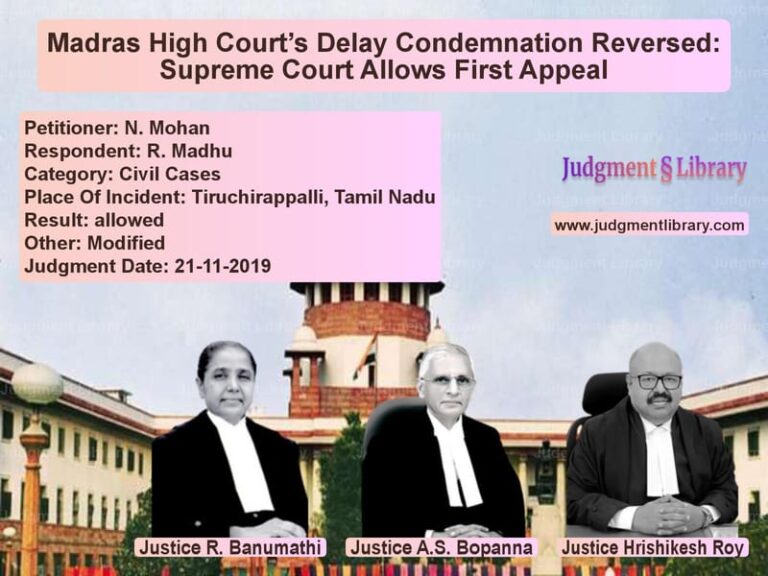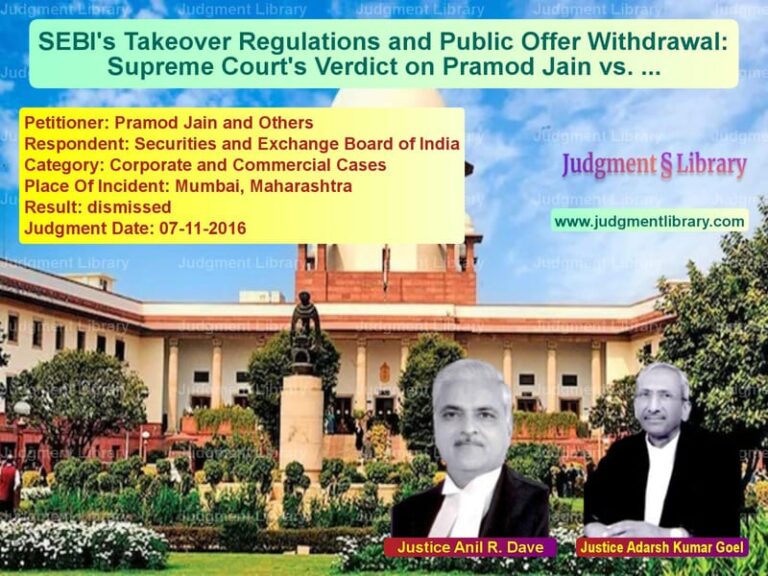Supreme Court Rules on Light Motor Vehicle Licenses for Transport Vehicles
The Supreme Court of India has ruled on a crucial legal issue regarding whether a person holding a driving license for a ‘Light Motor Vehicle’ (LMV) is automatically entitled to drive a ‘Transport Vehicle’ with an unladen weight not exceeding 7500 kg. The decision impacts commercial drivers, insurance claims, and regulatory policies under the Motor Vehicles Act, 1988.
Background of the Case
The case originated from multiple appeals filed by Bajaj Allianz General Insurance Co. Ltd. and other insurance companies challenging compensation claims in motor accident cases. The core issue was whether a driver holding a license for an LMV could legally drive a transport vehicle without a separate endorsement.
Previously, a three-judge bench in Mukund Dewangan v. Oriental Insurance Co. Ltd. (2017) had ruled that a person holding an LMV license could also drive transport vehicles of the same weight category without additional endorsements. However, insurance companies argued that this interpretation ignored specific provisions of the Motor Vehicles Act.
Legal Issues Considered
The case involved the following key legal questions:
- Does a driving license for a ‘Light Motor Vehicle’ (LMV) automatically allow the holder to drive a ‘Transport Vehicle’ up to 7500 kg?
- Does Section 3 of the Motor Vehicles Act require a specific endorsement for transport vehicles?
- Did the ruling in Mukund Dewangan fail to consider all relevant legal provisions?
- What is the impact of such a ruling on accident liability and insurance claims?
Arguments by Insurance Companies
The insurance companies, represented by Senior Counsel Tushar Mehta and R. Venkataramani, argued:
- Section 3 of the Motor Vehicles Act explicitly states that a person must hold a valid driving license ‘specifically entitling’ them to drive a transport vehicle.
- The Mukund Dewangan ruling ignored provisions requiring separate endorsements for commercial vehicles.
- Allowing LMV drivers to operate transport vehicles without special training increases road safety risks.
- The government’s 2021 notification aligning with Mukund Dewangan should not be treated as a policy decision.
Arguments by Drivers and Claimants
The drivers and accident claimants, represented by Senior Counsel Jayant Bhushan and Amit Kumar Singh, countered:
- The interpretation in Mukund Dewangan was legally sound and had been accepted by the government.
- Commercial drivers had relied on this ruling for years, and overturning it would disrupt their livelihoods.
- The requirement of additional endorsements unfairly burdens small transport vehicle operators.
- The Motor Vehicles Act does not distinguish between personal and commercial LMVs under 7500 kg.
Supreme Court’s Observations
The Constitution Bench, comprising Chief Justice D.Y. Chandrachud and Justices Hrishikesh Roy, P.S. Narasimha, Pankaj Mithal, and Manoj Misra, analyzed the relevant legal provisions and arrived at the following conclusions:
1. Interpretation of Section 3 of the Motor Vehicles Act
The Court emphasized that Section 3 of the Act requires a separate endorsement for transport vehicles:
“No person shall drive a transport vehicle unless his driving license specifically entitles him to do so.”
2. Government’s Stance and Policy Considerations
The Court acknowledged that the government had issued notifications in 2018 and 2021 aligning with Mukund Dewangan. However, it clarified:
“These notifications should not be treated as a policy declaration but rather as a response to the Supreme Court ruling. The government retains the power to amend regulations if needed.”
3. Road Safety and Public Interest
The Court noted the importance of road safety, stating:
“While commercial drivers rely on this interpretation, road safety concerns necessitate a careful review of licensing requirements for transport vehicles.”
4. Need for Legislative Clarification
The Court refrained from immediately reversing Mukund Dewangan, instead directing the government to conduct a policy review:
“Given the economic and social impact, we direct the Union Government to evaluate whether changes in law are necessary and report to this Court within two months.”
Final Verdict
The Supreme Court ruled:
- The ruling in Mukund Dewangan remains in force until further notice.
- The government must conduct a policy review and submit its findings by 22 November 2023.
- No immediate changes to licensing rules will be enforced.
- Pending insurance cases affected by this interpretation may be reviewed after the government’s report.
Implications of the Judgment
This ruling has wide-reaching consequences:
- Maintains Status Quo: LMV license holders can continue to drive transport vehicles up to 7500 kg unless the government changes regulations.
- Future Regulatory Changes Possible: The government may introduce separate licensing requirements.
- Impact on Insurance Claims: Insurance companies may challenge compensation claims based on driver eligibility.
- Road Safety Considerations: A policy review may result in new safety regulations for commercial vehicles.
Conclusion
The Supreme Court’s ruling in Bajaj Allianz General Insurance Co. Ltd. vs. Rambha Devi & Ors. clarifies that the existing interpretation of Mukund Dewangan remains in force for now. However, the government has been directed to reassess its position, which may lead to future changes in transport vehicle licensing laws.
For drivers, transport operators, and insurance companies, this ruling underscores the evolving nature of motor vehicle laws and the importance of staying informed about legal developments.
Petitioner Name: Bajaj Allianz General Insurance Co. Ltd..Respondent Name: Rambha Devi & Ors..Judgment By: Justice D.Y. Chandrachud, Justice Hrishikesh Roy, Justice P.S. Narasimha, Justice Pankaj Mithal, Justice Manoj Misra.Place Of Incident: India.Judgment Date: 13-09-2023.
Don’t miss out on the full details! Download the complete judgment in PDF format below and gain valuable insights instantly!
Download Judgment: bajaj-allianz-genera-vs-rambha-devi-&-ors.-supreme-court-of-india-judgment-dated-13-09-2023.pdf
Directly Download Judgment: Directly download this Judgment
See all petitions in Motor Vehicle Act
See all petitions in Compensation Disputes
See all petitions in Road Accident Cases
See all petitions in Judgment by Dhananjaya Y Chandrachud
See all petitions in Judgment by Hrishikesh Roy
See all petitions in Judgment by P.S. Narasimha
See all petitions in Judgment by Pankaj Mithal
See all petitions in Judgment by Manoj Misra
See all petitions in Remanded
See all petitions in supreme court of India judgments September 2023
See all petitions in 2023 judgments
See all posts in Accident Cases Category
See all allowed petitions in Accident Cases Category
See all Dismissed petitions in Accident Cases Category
See all partially allowed petitions in Accident Cases Category







